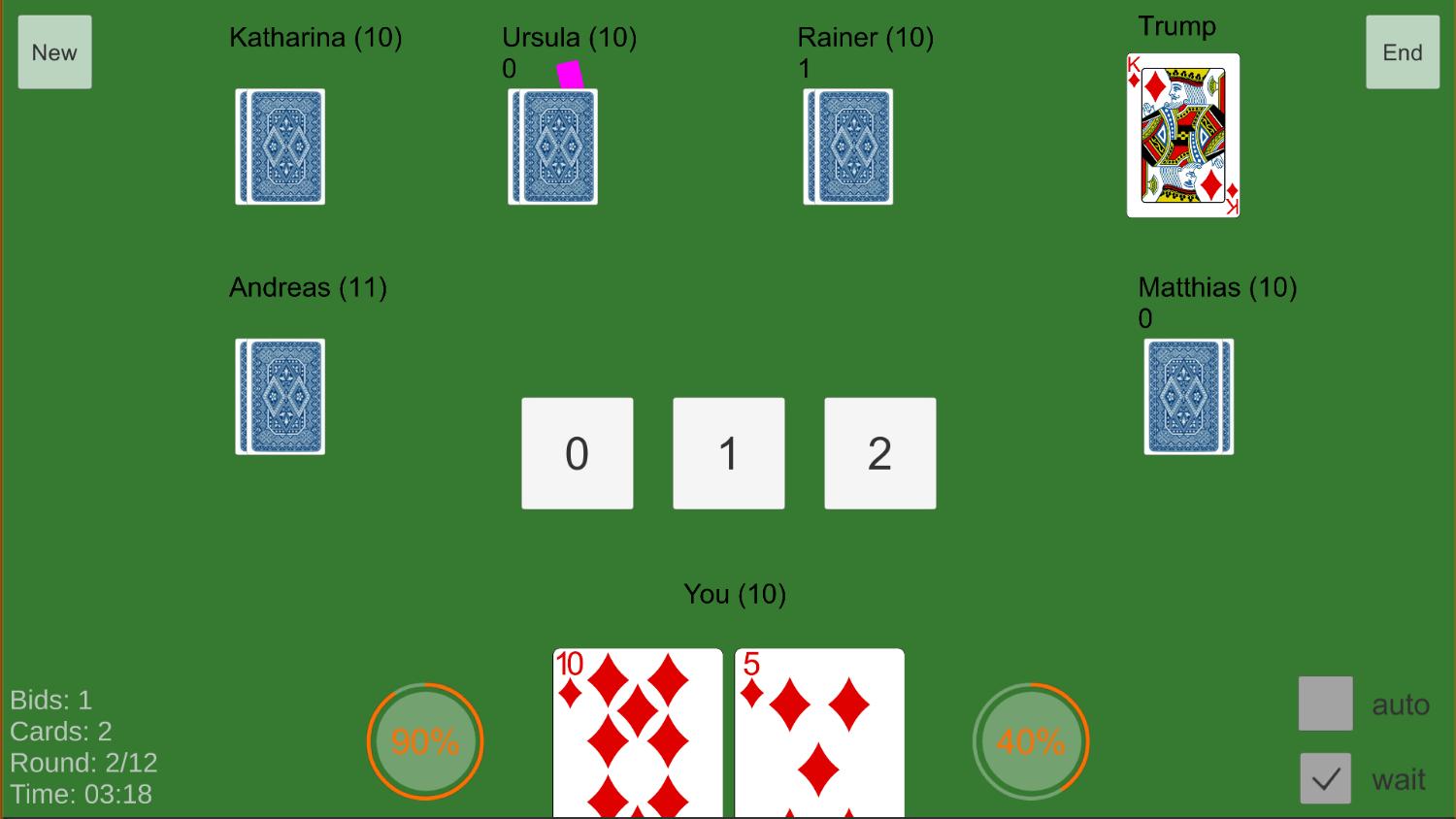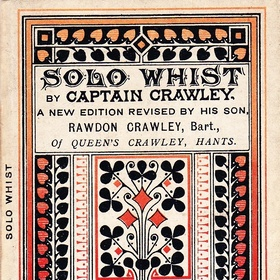Whist
Posted : admin On 4/9/2022- Whistleblower
- Whistler's Mother
- Bid Whist Plus On Facebook
- Whistle Pig
- Whistler Blackcomb
- Whistle
- Play Whist Online With 3-12 Players - CardzMania
The lethargic youth contrived without any additional rousing to set out two card-tables; the one for Pope Joan, and the other for whist. The whist-players were Mr. Sep 22, 2019 Whist is a game designed for 2 or 4 players. Whist’s most classic form involves 4 players, but has since been superseded by the 2-player variant, which adds the multi-phase stages which rewards thinking ahead. All you need to play Whist is the standard 52-card Anglo American deck with Jokers removed. The classic game of whist is a plain-trick game without bidding for 4 players in fixed partnerships. There are four players in two fixed partnerships. Partners sit facing each other. A standard 52 card pack is used.
| Origin | England |
|---|---|
| Alternative names | Solo |
| Type | trick-taking |
| Players | 4 |
| Cards | 52-card |
| Deck | Anglo-American |
| Play | Clockwise |
| Card rank (highest first) | A K Q J 10 9 8 7 6 5 4 3 2 |
| Related games | |
| Whist | |
Solo Whist, sometimes known as English Solo[a] or simply Solo, is a trick-takingcard game for four players. Despite the name it is not related to Whist, but derives from an early form of Boston played in the Low Countries, whose direct ancestor, in turn, was the 17th-century Spanish game of Ombre.[1] Its major distinctive feature is that one player often plays against the other three. However, players form temporary alliances with two players playing against the other two if 'Prop and Cop' is the current bid. It requires four players using a standard 52 card deck with no jokers. Aces are high and the deal, bidding and play are clockwise.
History[edit]
Solo Whist was first played in the Low Countries in the first half of the 19th century and in England somewhere about the year 1852 by a family of DutchJews. It was practically unknown outside Jewish circles until the end of the 1860s. From 1870 and 1872 it began to be played in the London sporting clubs in an attempt to supplant the card games formerly in vogue.[2]
Solo Whist derives from an early variety of Boston Whist through a Flemish form of the game called 'Ghent Whist' [3] and became popular in Britain as a relaxation from the rigours of partnership. In the event, it remains an essentially informal game of home and pub, and is played for the interest of small stakes rather than for the more arcane pleasures of ingenious coups and complex scores.
Solo whist may have failed to attract the attention that it deserved because it did not develop a scoring system of comparable refinement, and were it not for the phenomenal expansion of Bridge, Solo might have developed further and occupied the social position now claimed by Contract. The game is now mainly played in Britain, Australia and New Zealand,[4] and also especially popular within the Jewish community.[5]
Dealing[edit]
The cards are shuffled by the dealer and cut by the player to dealer's right. They can be dealt in ones but it is common practice to deal the cards in groups of three and then a single card for the last round (3,3,3,3,1). The last card is turned face up to indicate the trump suit for that game. The exposed card is part of the dealer's hand and he can pick it up once everyone has noted it. The turn to deal passes to the left after each hand.
A common alternative is to deal with a ' rotating 4 ' as follows : 4,3,3,3 3,4,3,3 3,3,4,3 3,3,3,4 which has the advantage of concluding with 4 to the dealer to confirm a correctly dealt hand .
Trumps may also decided by a pre- determined sequence, usually H,C,D,S - and so differing from bridge .
In some variations the cards are not shuffled after every game, this creates the possibility of a hand having several cards of the same suit making Solo and Abundance hands much more likely.
Bidding[edit]
Beginning with the player to dealer's left, each competitor may make one of the bids in the table below or pass. If someone bids, then subsequent players can either pass or bid higher. The bidding continues around the table as many times as necessary until the contract is settled. If everyone passes or there is a Prop without a Cop then the hands are thrown in and dealt again.
| Call | Description | Proposer Points | Further notes |
|---|---|---|---|
| Prop and Cop | Two players attempt to win eight tricks together. The first player calling Prop and the remaining players invited to call Cop | +/- 1 | Both proposer and accepter score.[6] |
| Solo | One player attempts to make five tricks alone | +/- 3 (wins or loses one unit from other players) | |
| Misère | One player thinks they will win no tricks | +/- 6 (wins or loses two units from other players) | There is no trump |
| Abundance | One player thinks they can win nine tricks | +/- 9 (wins or loses three units from other players) | Proposer picks the trump |
| Royal Abundance | One player thinks they can win nine tricks in the current trump | +/- 9 (wins or loses three units from other players) | |
| Misère Ouverte | One player thinks they will win no tricks with their hand placed face up on the table after the first trick is complete | +/- 12 (wins or loses four units from other players) | There is no trump |
| Abundance Declared | One player thinks they can win all 13 tricks with their hand placed face up on the table after the first trick is complete | +/- 18 (wins or loses six units from other players) | Proposer leads first. There is no trump |
Play[edit]
The player to the dealer's left leads the first trick, except in the case of an Abundance Declared in which case the bidder leads. Any card may be led and the other three players must follow suit where possible. A player with no card of the led suit may play a trump. If any trumps are played, then the trick is won by the highest trump card. If there are no trumps, it is won by the highest card in the suit that was led. The winner of the trick gets to lead to the next, so that once a player has succeeded or failed in their bid, scores are adjusted. The deal then passes to the left and the next hand begins.
Variations[edit]
Morris Fagelson Variation[edit]
A common version of Solo played among the Jewish community in Essex and East London show the following differences:
- A Prop and Cop pairing need to win seven tricks. Players only get one bid, except the person to the dealer's left who is able to bid twice, although, if someone Props without a Cop, they still have the option to upgrade to a Solo no matter where they sit. The Proposer picks the trump in an Abundance Declared hand.
Straight Solo[edit]
- In this variation, Prop and Cop is eliminated and only individual hands are allowed.
High-scoring Solo[edit]
- To increase the proportion of hands with uneven distributions, some play that the cards are shuffled only at the start of a session and after a bid of abundance or higher, while others play that the cards are never reshuffled after the opening deal. The cards are simply gathered together by the new dealer and the player to the dealer's right cuts. One variant allows for a -1 penalty for any player who reflexively shuffles the cards.
Different Trumps[edit]
- Instead of turning the dealer's last dealt card for trump, some cut a card from a second pack. Others go through the trump suits in cyclic order: hearts, clubs, diamonds, spades, hearts, etc. Some even add 'no trumps' into that cycle.
Grand Slam Solo[edit]
- Uses rules for the Straight Solo and High-scoring Solo above, as well as the cyclical trump order described in 'Different Trumps' above. Additionally, the 'Abundance Declared' is replaced with two bids: A Petit Slam and a Grand Slam. The Petit Slam requires the bidder to make 12 tricks, and is scored above a Royal Abundance but below a Misère Ouverte. The Grand Slam, like an Abundance Declared, requires the bidder to make all 13 tricks, and ranks above all other bids. Both the Petit and Grand Slam bids allow the declarer to choose the trump suit.
Overtricks[edit]
- To spice up the game further, some play with a payment for overtricks in Prop and Cop, Solo and Abundance. In that case it is usual to set the basic score for a solo as four, five or six units, increasing the other scores in proportion. Each overtrick or undertrick in a Prop and Cop or Solo is worth an extra unit. In Abundance, overtricks gain an extra two units each, but undertricks cost only one unit each. There is no score for over or undertricks in Misère, Misère Ouverte or Abundance Declared.
Irish Solo[edit]
- There are two phases of the game, the bidding and the play. During bidding players try and win the bid by claiming to be able to win more tricks than the previous player claimed. There are no things such as those mentioned above like 'Prop & Cop' etc., nor are there various points, it is just straight bidding similar to Bridge. For example, a player who calls 'six spades' will try to win six tricks with spades as trumps, but be outbid if another player calls 'seven hearts.' The one who wins the bidding round is the one who goes 'solo' in the play phase. The solo player is playing against the other three players. The goal is to win what he said he could win, the goal of the other three is to stop him.
- If there is betting each trick is given a certain value and the pot is given by the number of tricks that were bid.
- If the solo player gets the bid he/she wins the pot, if the other three stop him/her from achieving it they split the pot between them.
- If there is a player short then, before bidding, that hand is laid open on the table and whoever wins the bidding places it opposite their seat and plays from it after the player following them has played a card.
Whistleblower
Obs: A bid of Misère claims to be able to lose all 13 tricks, its value is equivalent to attempting to win 12 tricks. The suit order and no trumps have the same status order as in Bridge.
In literature[edit]
Whistler's Mother

In Robert W Service's poem 'The Shooting of Dan McGrew', Dan McGrew is playing Solo in the back of the bar. His bid is 'Spread Misère'. Presumably that is the same bid as Misère Ouverte.
Trivia[edit]
- The words 'Misère', 'Ouverte', 'Grand', and 'Petit' are French and mean misery, open, large, and small, respectively. The hands Royal Abundance and Abundance Declared are also known as Abundance Royale and Abundance Declaree; Abundance is sometimes nicknamed Bundle.
See also[edit]
Footnotes[edit]
- ^'English Solo' to distinguish it from e.g. German Solo, Irish Solo and Spanish Solo)

References[edit]
- ^Parlett 1991, p. 210. sfn error: no target: CITEREFParlett1991 (help)
- ^Wandering Jew Card Game & How to win at Whist, vol. 4 p. 37, R. D. Manning, 1999 ISBN978-1-895507-02-7
- ^Oxford Dictionary of Card Games, David Parlett, pg. 273 ISBN0-19-869173-4
- ^McLeod, J (2006). 'Rules of Solo'.
- ^Zangwill, I (1892). 'Children Of The Ghetto'.
- ^The Pan Book of Card Games - Hubert Philips ISBN0-330-20175-1.
Bibliography[edit]
Bid Whist Plus On Facebook
- Parlett, David (1991). A History of Card Games, OUP, Oxford. ISBN0-19-282905-X
External links[edit]
This page is partly based on a contribution from Alan Holdsworth.
Introduction
German Whist is an adaptation of classic Whist for two players. There is nothing German about it - as far as I know it is of British origin.
Players and Cards
This is a game for two players only, using a standard pack of 52 cards ranked A(high) K Q J 10 9 8 7 6 5 4 3 2 (low) in each suit.
Deal
The players agree who should deal first, and the turn to deal alternates after each hand. The deal is 13 cards each, dealt one at a time. The stock of undealt cards is placed on the table, face-down except for the top card which is turned face-up and placed on top of the stock. The suit of this face-up card determines the trump suit for the hand.
Play
The play is in tricks and consists of two stages: in the first stage the players compete to win good cards from the stock to add to their hand; in the second stage, when the stock is empty, the object is to win the majority of the tricks. The non-dealer leads (plays the first card) to the first trick.
A trick consists of one card played by each player. The person who plays first to a trick may play any card, and the other player must play a card of the same suit if possible. Having no cards of the suit led, the second player may play any card. If both cards are of the same suit, the higher card wins the trick. If they are of different suits the first player wins unless the second player played a trump, in which case the trump wins.

When you win a trick you must take the face-up card from the top of the stock and add it to your hand. The loser then takes the next card of the stock, which is face-down, without showing it to the winner, so that both players again have 13 cards in their hands. The two cards played to the trick are turned face down and set aside, the top card of the remaining stock is turned face-up. This does not change the trump suit - the suit of the card turned up at the start of the play remains trump until all the cards have been played. The winner of the trick just played leads a card to the next one.
Whistle Pig
Play continues in this way until, after 13 tricks have been played, there are no cards left in the stock. The winner of the 13th trick leads, and the play continues without replenishment until after 13 more tricks both players run out of cards. In this second stage each player keeps the tricks they won in front of them, and whoever wins the majority of the 13 tricks of this second stage wins the hand.
Tactics
Notice that tricks won in the first stage do not count towards winning the game; the sole aim in the first stage is to collect cards that will enable you to win the majority of tricks in the second stage. Therefore you only try to win a trick if you judge that the exposed card on top of the stock is likely to be better than the card underneath it. For example if hearts are trumps and the exposed card is the 5 you would definitely try to lose the trick, as the next card is likely to be better. Even if the exposed card is average (say the J) you would not use a high card to win it, as all this would achieve would be to replace a high card in your hand by an average one.
Variations
In the game described above, the requirement to follow suit in the first stage of the game cannot be enforced in practice. In many cases, a player who later produces a card of the suit he previously claimed not to have could have drawn that card from the stock. Therefore the game is often played without the requirement to follow suit in stage 1 - in this stage the second player may play any card, though only a higher card of the same suit or a trump wins the trick.
Some count all the tricks towards winning, rather than just the tricks in stage 2. The player who wins the majority of the 26 tricks wins, and if each player takes 13 the game is drawn.
Whistler Blackcomb
Jonny Groves has developed a variant Honeymoon Whist that incorporates both the above variations and adds two jokers to the deck.
Software
Malcolm Bain's German Whist program for Windows is available from Card Games Galore.
Whistle
A shareware program for playing German Whist against your computer or an online opponent can be downloaded from MeggieSoft Games.
Play Whist Online With 3-12 Players - CardzMania
PyGermanWhist is a free German Whist game that can be played against the computer.